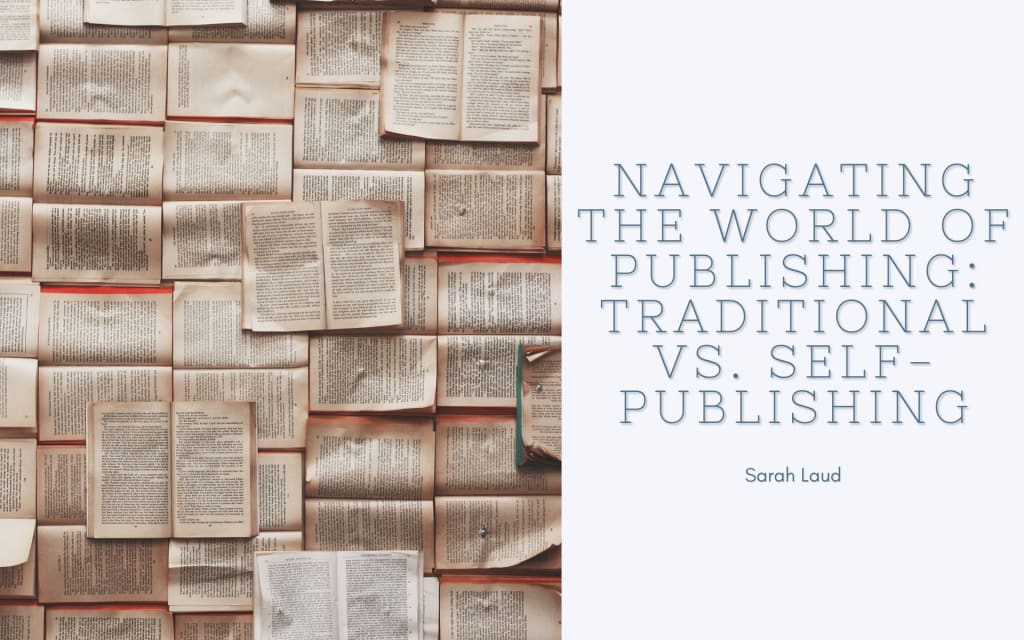Navigating the World of Publishing: Traditional vs. Self-Publishing
Sarah Laud

Publishing your book is an exciting journey, but choosing the right path can be daunting. There are two main paths you can take: Traditional Publishing or Self Publishing. Let's break down the pros and cons of each, so you can make an informed choice that suits your goals as an author.
Traditional Publishing: The Time-Honored Route
Traditional publishing involves working with a publishing house that has been around for a long time. This option offers some great advantages, such as access to experienced editors, marketing teams, and established distribution networks. With their support, your book can reach a broader audience faster and more effectively. Moreover, traditional publishers may offer you an advance payment for your book and pay you royalties on sales, which can be rewarding.
However, traditional publishing has its drawbacks too. Publishers can be selective and may take several months or even years to complete the process. You might also need to sign contracts that limit your creative control and rights to the book. And while they bring experience and expertise, traditional publishers can take a substantial cut of your royalties, making it challenging to earn a significant income from book sales.
Self Publishing: Empowering Authors
Self publishing allows authors to take full control of their book's creation, distribution, and marketing. With this route, you can move faster since you decide how quickly your book is published and distributed. Additionally, you retain complete creative control over your work and keep all the royalties, typically around 70%.
This option empowers first-time authors and those seeking creative freedom. Many best-selling works have been self-published initially, proving its potential. You can even use self publishing as a marketing tool for your related business, attracting potential clients and building your brand.
However, self publishing is not without challenges. Authors are responsible for covering all the costs associated with creating and marketing their book. Self-published books might lack the immediate industry credibility of traditionally published ones, and finding readers and managing distribution networks can be demanding and time-consuming.
Choosing the Right Path for You
Ultimately, the decision to self publish or go the traditional route depends on your goals as an author. Traditional publishing offers established distribution networks, industry credibility, and access to experienced professionals, but it can come with reduced creative control and a significant cut of royalties. On the other hand, self publishing grants you creative freedom, full royalties, and faster timelines, but requires more effort in managing the publishing process and building your readership.
Resources to Navigate Your Choice
Regardless of your chosen path, various resources can help you along the way. For traditional publishing, consider hiring a coach to guide you through the writing and querying phase, easing the pressure and increasing your chances of finding a literary agent.
If you opt for self publishing, a coach can be invaluable in assisting you with writing, editing, marketing, and all aspects of the self-publication process. Self publishing can be complex, but having an expert by your side ensures you publish the best possible product.
Traditional vs. Self Publishing: Key Considerations
Both traditional and self publishing have their merits. Traditional publishing offers industry support and recognition, but it comes with less control and a slower process. Self publishing grants you full control and better financial rewards, but it requires taking on more responsibilities and building your readership.
The world of publishing has expanded to offer authors more choices than ever before. Whether you choose traditional publishing with its established support system or venture into the empowering realm of self publishing, the decision should align with your specific goals and aspirations. Remember that both paths have their advantages and challenges, so take the time to research and make the best choice for you and your book.
About the Creator
Sarah Laud
Sarah Laud is an accomplished student and a competitive horseback rider with over a decade of experience.






Comments
There are no comments for this story
Be the first to respond and start the conversation.